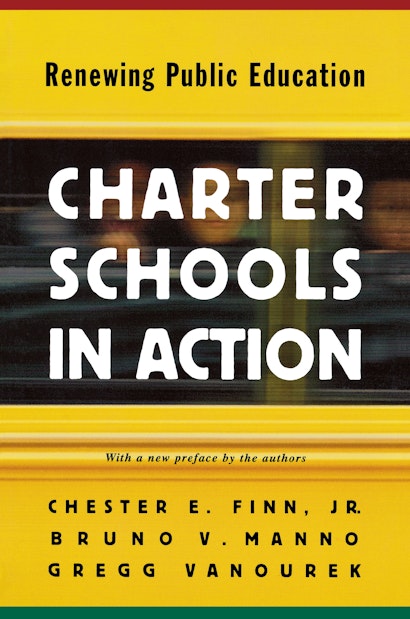Can charter schools save public education? This radical question has unleashed a flood of opinions from Americans struggling with the contentious challenges of education reform. There has been plenty of heat over charter schools and their implications, but, until now, not much light. This important new book supplies plenty of illumination.
Charter schools—independently operated public schools of choice—have existed in the United States only since 1992, yet there are already over 1,500 of them. How are they doing? Here prominent education analysts Chester Finn, Bruno Manno, and Gregg Vanourek offer the richest data available on the successes and failures of this exciting but controversial approach to education reform. After studying one hundred schools, interviewing hundreds of participants, surveying thousands more, and analyzing the most current data, they have compiled today’s most authoritative, comprehensive explanation and appraisal of the charter phenomenon. Fact-filled, clear-eyed, and hard-hitting, this is the book for anyone concerned about public education and interested in the role of charter schools in its renewal.
Can charter schools boost student achievement, drive educational innovation, and develop a new model of accountability for public schools? Where did the idea of charter schools come from? What would the future hold if this phenomenon spreads? These are some of the questions that this book answers. It addresses pupil performance, enrollment patterns, school start-up problems, charges of inequity, and smoldering political battles. It features close-up looks at five real—and very different—charter schools and two school districts that have been deeply affected by the charter movement, including their setbacks and triumphs. After outlining a new model of education accountability and describing how charter schools often lead to community renewal, the authors take the reader on an imaginary tour of a charter-based school system.
Charter schools are the most vibrant force in education today. This book suggests that their legacy will consist not only of helping millions of families obtain a better education for their children but also in renewing American public education itself.
Chester E. Finn, Jr. is President of the Thomas B. Fordham Foundation and John M. Olin Fellow at the Manhattan Institute. As a senior fellow at the Hudson Institute, he directed the "Charter Schools in Action" project. From 1985 to 1988, he served as Assistant U.S. Secretary of Education. Finn is the author or editor of hundreds of articles and a dozen books on education issues, including The Educated Child: A Parent's Guide, which he coauthored with William J. Bennett and John T.E. Cribb, Jr. Bruno V. Manno is Senior Fellow in Education at the Annie E. Casey Foundation and former U.S. Assistant Secretary of Education for Policy and Planning. Gregg Vanourek, who has served as Vice President for Programs at the Thomas B. Fordham Foundation and Research Fellow at the Hudson Institute, is an M.B.A. candidate at the Yale School of Management.
"A book that is masterful for its clarity of purpose, organization, and at times humor . . . This is a book that anyone with an interest in seriously reforming public education will find useful."—Nina Shokraii Rees, Philanthropy
"The best book yet on charter schools."—David Osborne, Washington Post Magazine
"A book that anyone interested in learning how charter schools have changed American education needs to read."—Martin Morse Wooster, The Washington Times
"[The authors] offer a thorough and evenhanded overview of the good, the bad and the confusing of the charterschool movement."—Rebecca Jones, American School Board Journal
"The charter school movement is one of the most promising reforms to hit public education in a long time, and no one is better prepared to explain its significance than Finn, Manno, and Vanourek. These scholars have been studying the ins and outs and ups and downs of charter schools from the beginning, documenting the successes and limitations of the charter model for policymakers in Congress and in statehouses across the country. Now they are doing the same for the general public with this informative, insightful, and inspiring book. I would encourage anyone who cares about the future of our public schools to read it."—Senator Joseph Lieberman
"This book offers the most authoritative account yet of the American charter schools movement. It is wide-ranging in scope, brimming with important new data, beautifully written and argued, and crafted with insight and intelligence."—Terry M. Moe, Stanford University
"This book does a superb job of representing the charter school movement.... It will become a backbone—if not the backbone—of charter school knowledge for a wide range of readers."—Caroline M. Hoxby, Harvard University
"The issues surrounding charter schools are probably the most important and vibrant ones in public education today. While bits and pieces of the charter school story currently exist, nothing of a systematic nature has been available until now. The authors have pulled together a truly wide-ranging body of evidence, effectively combining data analysis, case studies, first-person accounts, and deep intellectual ideas. Charter Schools in Action will be a valuable source book that shapes the way people think about the issues."—Eric A. Hanushek, University of Rochester
"An original and valuable book. No other book provides such a thorough overview of the thinking behind the charter school movement, and so carefully puts charter schools in context of other efforts to improve education. It should be must-reading for state legislators, public school administrators, school board members, education reporters, philanthropists, and people interested in operating charter schools."—Paul Hill, University of Washington


